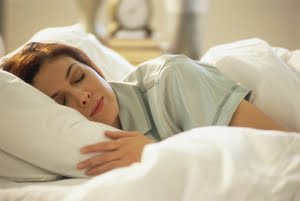
Woman Sleeping 2002
While everyone in today’s society realizes that we should all be doing things to contribute to our own personal health and wellness, many people overlook some of the most obvious things each of us can do. Many factors, it is true, go into both health and wellness, among them the genes we inherited, where we live, and what we do for a living. But one of the most basic elements of health –getting the proper amount of rest-often seem to fall off the radar screen as people get caught up in the latest celebrity.
No matter who you are, what your age, what you do for a living, or what your lifestyle, one thing is basic to all of us: our bodies need a good night’s sleep, even if different people’s immediate sleep needs, those they feel every day, seem different.
For some people, especially teens and 20-somethings who all seem to be constantly burning the candle at both ends, sleep does not seem all that necessary…a few hours here and there suffice to keep them going….for a while. But sooner or later they crash, sometimes sleeping for 10 hours or more as their bodies apparently try to catch up on the sleep they missed. Meanwhile some older folks find that they can’t stay asleep all night long, but then need to take one or more naps during the day.
For all this, however, the actual purpose of sleep is still something of a mystery to science: we know what happens when people are deprived of sleep –drowsiness, a lack of mental focus, disorientation, and a suppressed immune system- but we still do not know precisely why we sleep or what happens when we sleep.
But no matter what your age, there are a few basic steps everyone can take to contribute to a good night sleep, and writer Leslie Barrie listed a number of these practices in a recent article.
Among them are:
- Cut out your afternoon caffeine habit. Remember, caffeinated coffee isn’t the only common source of caffeine; chocolate (in any form), many sodas (especially colas), many teas, even some flavored waters contain caffeine which could, even hours later, harm your ability to fall asleep.
- Chose the right foods. Foods high in sugar will tend to keep you awake. A combination of protein and carbs, however, will aid your body’s natural sleep rhythm.
- If you drink alcohol, drink it earlier. True, alcohol makes you drowsy; but it also interferes with the normal sleep cycle. If you want a drink and want a good night’s sleep, drink earlier, rather than later.
- Avoid hot showers and baths right before bedtime. This may sound backwards –after all, what’s more relaxing than a good, hot soak?- but your body cannot fall into a relaxing sleep when it is too hot. If you want a good night’s sleep, take the hot shower at least an hour before bedtime.
- Disconnect. Turn off the cell phone, the Blackberry, and the laptop. Beyond that, do not try to end your day be answering e-mails in bed just before turning off the light. The stimulation of even reading Facebook can reactivate your brain enough to make falling asleep difficult.
These tips should help you get a good night’s sleep, making you all the more alert and ready to take on the day the next morning. Give it a try!
